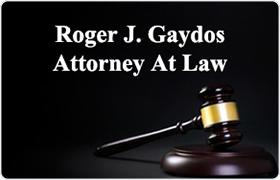Beallsville Trusts Lawyer, Pennsylvania
Sponsored Law Firm
-
 x
x

Click For More Info:
-
Roger J. Gaydos Attorney At Law
407 Oak Spring Rd. Canonsburg, PA 15317» view mapEstate Law A True Respect For The Law
Roger has attracted thousands of legal clients from all walks of life with a simple but important philosophy: "The law is friendly and he can prove it."
800-925-0620
Warning! No lawyers found in this specified area.
 Roger J. Gaydos, Sr. Canonsburg, PA
Roger J. Gaydos, Sr. Canonsburg, PA Practice AreasExpertise
Practice AreasExpertise
